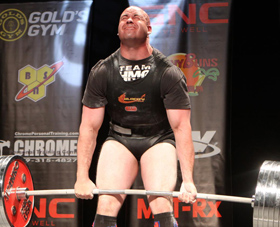Protein is essential for good health, but daily protein intake requirements are different for everyone. Bryan Dermody is here to give some tips to make sure you’re getting enough in your diet.
In answering the above question, I will assume my readers are those who require a high amount of protein due to the frequency and intensity with which they train. Here are easy things you can do to ensure that you consuming enough protein each day:
- Know how much you need:
The first problem many people run into when trying to consume enough protein each day is that they are not even sure how much they should be consuming. They end up consuming what they think is “a lot” with each meal, not knowing how much they are actually consuming. The end result is that they fall short of their actual protein needs. As a general rule, an individual should consume 1 gram of protein for every pound of bodyweight. That is, a 200-lb. person should consume 200 grams of protein each day. - Increase your feeding opportunities
Eating like an athlete, and more specifically, consuming enough protein each day, means that you will have to think outside the box of simple breakfast, lunch, and dinner when it comes to your daily food intake. I would recommend at least five feeding opportunities per day: breakfast, snack, lunch, snack, dinner. The snacks could easily be protein shakes. Following the directions from point #1, divide your protein requirement by the number of feeding opportunities per day to determine how much protein you need with each feeding opportunity. For example, 200 grams per day / 5 feeding opportunities = 40 grams per feeding opportunity. Of course, if need be, you can always increase your feeding opportunities per day (above 5) in order to consume the necessary amount of protein. - Eat your protein first
Your #1 priority when it comes to macronutrients at each meal should be lean protein. When putting together each meal make it a priority to consume 40 grams of protein (if we follow the example above) before filling up on carbs or fats. This also means that you cannot skip the first feeding opportunity of the day. There is a massive difference (especially over the long haul) between getting little-to-no lean protein in the first feeding opportunity of the day and getting 40-50 grams to start the day. - Shop like you want to eat
Prioritize lean protein on your weekly shopping list. You will eat what is available to you. If the majority of the food that you have in your house is lean protein sources, as opposed to carbohydrate sources or junk food, then that is what you will eat. Don’t even give yourself the option of choosing carbs over protein (not that eating some carbs is bad). Good sources of lean protein include lean meats (grass-fed beef, free-range chicken, bison, venison), low-mercury fish (salmon, tilapia, cod), free-range eggs, plain Greek yogurt, low-fat cottage cheese. Contrary to popular belief, nuts and nut butters are NOT high in protein. Rather, they are moderate in protein and high in fats. This does not mean that they are bad to consume, but one would have to consume an awful lot of calories in order to meet daily protein needs if they were the primary source of protein. - Supplement
It is often difficult (and inconvenient) to meet your daily protein needs through whole food consumption alone. A protein powder that is low in fat and carbs and made up of primarily whey or plant protein can do a lot to bridge the gap between whole food consumption and daily protein needs. - Make some swaps
The following food swaps can help you meet your daily protein requirements. Replace:- Cereal and oatmeal with eggs
- Bacon with turkey sausage
- Meatless salad with a salad topped with lean meat
- Regular yogurt with plain Greek yogurt
- Rice or pasta with high protein pasta or quinoa
- Typical snack of junk food or high carb food with beef jerky, a protein bar or low-fat cottage cheese





